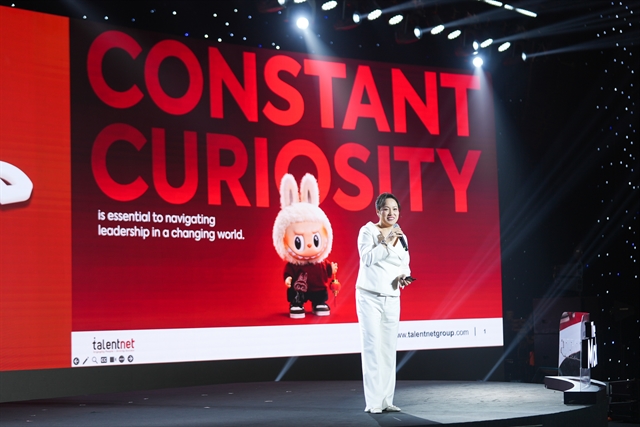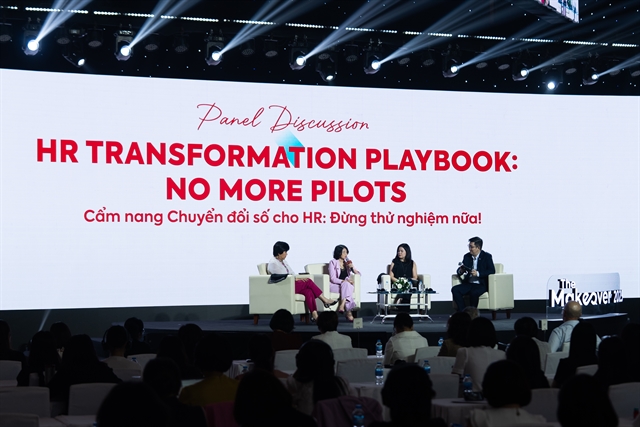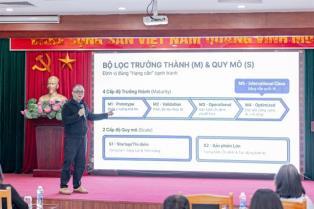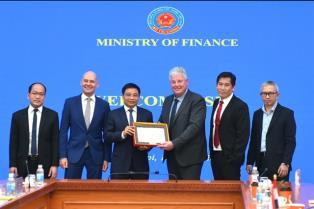Việt Nam is at the perfect moment to accelerate growth through artificial intelligence and technology, a conference heard in HCM City on October 15.

HCM CITY — Việt Nam is at the perfect moment to accelerate growth through artificial intelligence and technology, a conference heard in HCM City on October 15.
Organised by Talentnet, the two-day The Makeover 2025 – S-AI-LING AHEAD conference gathered over 15 global speakers, including senior executives from leading enterprises, and more than 1,000 participants to explore how organisations can adapt and act in the age of AI.
According to the 2025 AI Adoption in Vietnamese Enterprises report released at the conference by Talentnet, 91 per cent of Vietnamese businesses have used AI to some extent, but only half believe they are using it effectively, reflecting the “learning-by-doing” mindset typical of Vietnamese enterprises.
Encouragingly, only 2 per cent of employees said they were “not interested” in AI, while 90 per cent of businesses have developed or are developing internal regulations on its use, Tiêu Yến Trinh, CEO of Talentnet, said.
But just 14 per cent have effectively implemented AI policies, a gap that requires not only policies but also a mindset shift and a culture ready for transformation, she said.
To lead in this era, leaders must become “game-changers,” combining strategy, creativity, agility, and courage to shape the future, she said.
She described a shift in HR models from “à la carte” hiring (for fixed roles) to “buffet” models (combining flexible skills as needed) and “seasonal menu” models (engaging project-based talent).
In the AI age, leaders must move beyond being “distributors” to becoming “disruptors” or those who dare to innovate, she said.
In a world where technology can replicate almost anything, human identity and experience remain irreplaceable.
“Technology helps us move fast, but only human vision and courage can take us far.”
Leading corporations shared nearly 10 case studies on integrating AI into HR, management and organisational development.
Andre de Jong, vice president and managing director of Bosch Vietnam, said his company uses AI not just for growth but to empower people, transform industries and enhance quality of life.
He outlined three steps to building an AI culture at Bosch: AI training for all (AI literacy), AI as daily assistant (co-pilot mode) where it helps employees make faster decisions and automate tasks and AI-integrated culture to promote Human x AI Collaboration.
The world is entering an era of “Human x AI Collaboration,” where humans and AI expand each other’s capabilities, he said.
Bosch defines three levels of collaboration, he said: Human-in-command (Humans retain full control), Human-in-the-loop (Humans and AI make decisions together) and human-on-the-loop (AI operates autonomously under human supervision).
“AI must be invented for life and support people. We believe AI is not replacing humans.”
Transforming workforce strategies

A major discussion point among leaders and HR professionals was how HR should transform when technology becomes a core resource.
These ideas were discussed at the session “Transforming Workforce Strategies with AI & Digitalisation: The CHRO’s Next Chapter,” presented by Sujay Bhat, senior director of HR strategy advisory at SAP SuccessFactors Southeast Asia.
He said the challenge is not just adopting technology, but fostering collaboration and connection, helping employees feel heard, guided and empowered to move forward with AI.
Key HR priorities include bridging the gap between employees and the organisation, translating AI from concept to practical application and defining enablers for strategy execution.
Global Futurist Henrik von Scheel, known as the Father of Industry 4.0, said AI today mainly consists of ‘Symbolic AI’ and ‘Narrow AI’, which perform well in limited tasks. The world is at the peak of the ‘AI hype cycle’, where expectations are growing faster than real progress, he warned.
He also cautioned about the growing risk of ‘shadow AI,’ when employees independently use public or open-source AI tools at work, potentially exposing sensitive corporate data.
Amid opportunities and risks, he said HR is at a ‘historic turning point’, with the chance to evolve from a ‘cost centre’ into a ‘profit centre’ by focusing on people, culture and trust, the true drivers of sustainable value.
He also spoke about Việt Nam’s role in the global future, saying that the nation’s backbone is not services but manufacturing.
Only countries that create tangible products can achieve true strength, an advantage that makes Việt Nam attractive to global talent.
The biggest challenge is the engineering gap, a shortage of people who can build and innovate, and Việt Nam must invest strongly in technical education and attract skilled talent in its diaspora back home to avoid repeating Europe’s mistake, where the number of engineers dropped by 50 per cent in just five years, he said.
In addition to its focus on AI and business operations, The Makeover also featured practical topics on reward strategy, benefits design, leadership succession, culture building, employee engagement, and management change. — VNS




